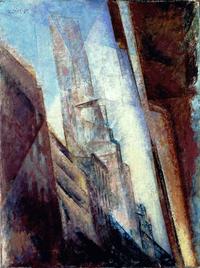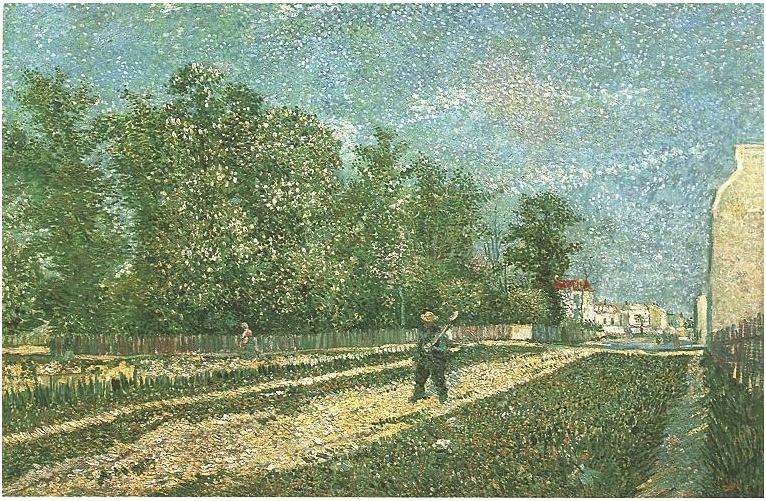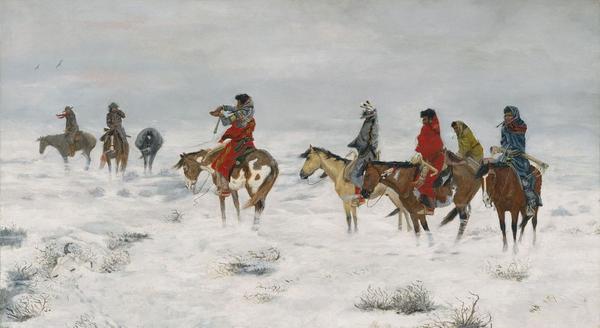
Lyonel Feininger (1871–1956) Manhattan II, 1940. Oil on canvas. © Artists Rights Society (ARS), New York/VG Bild-Kunst, Bonn Modern Art Museum of Fort Worth, Anonymous Gift
In commemoration of the 5oth anniversary of the assassination of President John F. Kennedy, the Amon Carter Museum of American Art will exhibit the artworks installed in the president’s suite at the Hotel Texas during his visit to Fort Worth in 1963. On view from October 12, 2013, through January 12, 2014, Hotel Texas: An Art Exhibition for the President and Mrs. John F. Kennedy is presented in association with the Dallas Museum of Art, which organized the exhibition.
The original installation, orchestrated by former Amon Carter Board President Ruth Carter Stevenson (1923–2013) and a small group of Fort Worth art collectors, was created especially for the president and first lady in celebration of their overnight visit to the city. It included paintings by Thomas Eakins, Lyonel Feininger, Marsden Hartley, and Franz Kline, and sculptures by Henry Moore and Pablo Picasso, among others. The exhibition highlights the diverse and thoughtful installation of artworks brought together for the presidential couple.
“It was important for the Amon Carter to partner with the DMA on this project,” says Andrew J. Walker, museum director. “The story has roots in Fort Worth, and our former Board President Ruth Carter Stevenson was closely involved. She helped activate the city’s cultural leaders to donate great artworks to outfit the presidential couple’s hotel suite so that it represented Fort Worth’s hospitality and cultural sophistication. The unexpected tragedy that followed has overshadowed this great expression, and we appreciate the opportunity to tell the story of the Kennedy’s visit to Texas from a different, more uplifting perspective.”
Hotel Texas will reveal for the first time the complete story of the presidential suite 850 installation and examine the significance of art both to the Kennedys and to the Fort Worth and Dallas communities. It will bring to light related materials, most of which have remained in private collections since 1963, including photographs, videos and other archival materials ranging from images of the suite prior to the couple’s arrival to documentation relating to the president’s assassination.
“In reuniting these works of art and unveiling this story, we hope to inspire some historical reflection about the Kennedys’ keen interest in and appreciation of the arts, as well as the significance of presenting for the first time to the public this wide-ranging group of masterworks,” says Olivier Meslay, associate director of curatorial affairs at the Dallas Museum of Art and curator of the exhibition. “Hotel Texas also reveals a signature moment in the history of art, as half a century ago American art was receiving worldwide acclaim.”
Five days prior to the presidential couple’s arrival in Fort Worth, descriptions of the presidential suite at the Hotel Texas were released to the public. Unhappy with the couple’s accommodations, Owen Day, the art critic for the Fort Worth Press, proposed the idea of the installation to prominent art collector and leader of the Fort Worth Art Association Samuel Benton Cantey III. With the support of Ruth Carter Stevenson, collector Ted Weiner and Amon Carter Director Mitchell Wilder, Cantey conceived a three-part exhibition that would unfold in the parlor, master bedroom and second bedroom of suite 850. Drawing on local private and public art collections, each room of the suite was outfitted with works of art that befitted the tastes and interests of President Kennedy and the first lady:
The Parlor featured a work by the impressionist painter Claude Monet (1840–1926), alongside works of modern sculpture and painting, including the bronze sculpture Angry Owl by Pablo Picasso (1881–1973); an oil painting of Manhattan by American expressionist Lyonel Feininger (1871–1956) (above); an oil-on-paper study by Franz Kline (1910–1962); and a bronze sculpture by Henry Moore (1898–1986).
The Master Bedroom, which was designated as Jacqueline Kennedy’s bedroom, was adorned with impressionist masterworks per her well-known affinity for the genre. The room included

Summer Day in the Park by Maurice Prendergast (1858–1924);

Road with Peasant Shouldering a Spade by Vincent van Gogh (1853–1890);
Sea and Rocks by John Marin (1870–1953); and

Bassin de Deauville by Raoul Dufy (1877–1953).
The Second Bedroom, the president’s room, featured late 19th-century and early 20th- century American art, including

Thomas Eakins’ (1844–1916) Swimming,

Marsden Hartley’s (1877–1943) Sombrero with Gloves

and Charles M. Russell’s (1864–1926) Lost in a Snowstorm, among others.
Within the exhibition visitors will be able to reflect on Kennedy’s assassination and the legacy of his presidency by viewing a film that chronicles his and Mrs. Kennedy’s two-day trip to Texas, listening to oral histories of the event by local residents, and sharing their own thoughts and memories in a collaborative journal. The video and oral histories appear courtesy of the Oral History Collection, The Sixth Floor Museum at Dealey Plaza. The exhibition is accompanied by a catalogue, published in association with Yale University Press, that includes illustrations of the presidential visit to Texas never published before now. It retails for $24.95 in the Museum Store + Café.
Hotel Texas: An Art Exhibition for the President and Mrs. John F. Kennedy is organized by the Dallas Museum of Art in association with the Amon Carter Museum of American Art. The Fort Worth presentation of the exhibition is supported in part by generous contributions in memory of Ruth Carter Stevenson from Shirlee J. and Taylor Gandy and Bob and Patricia Schieffer.